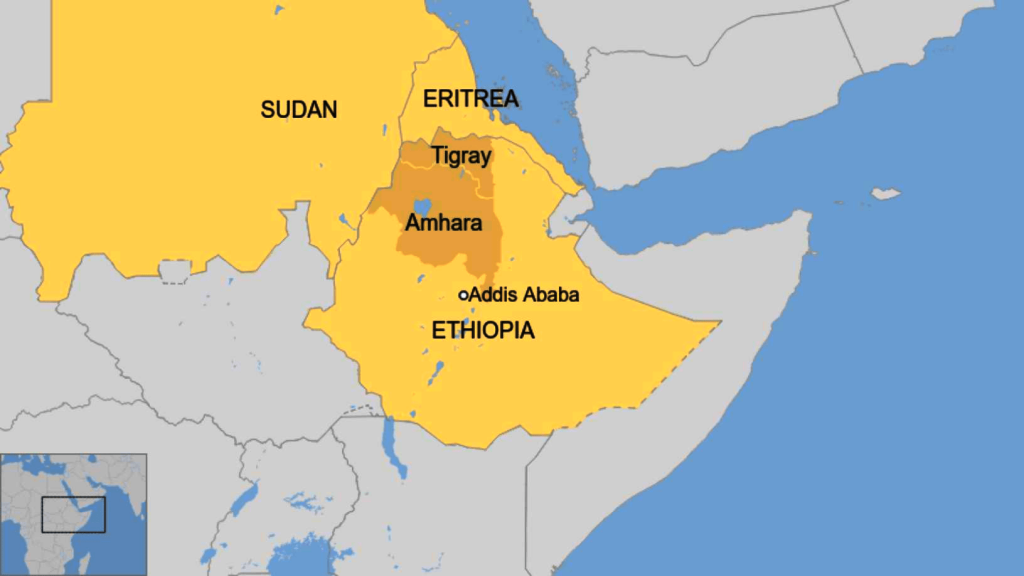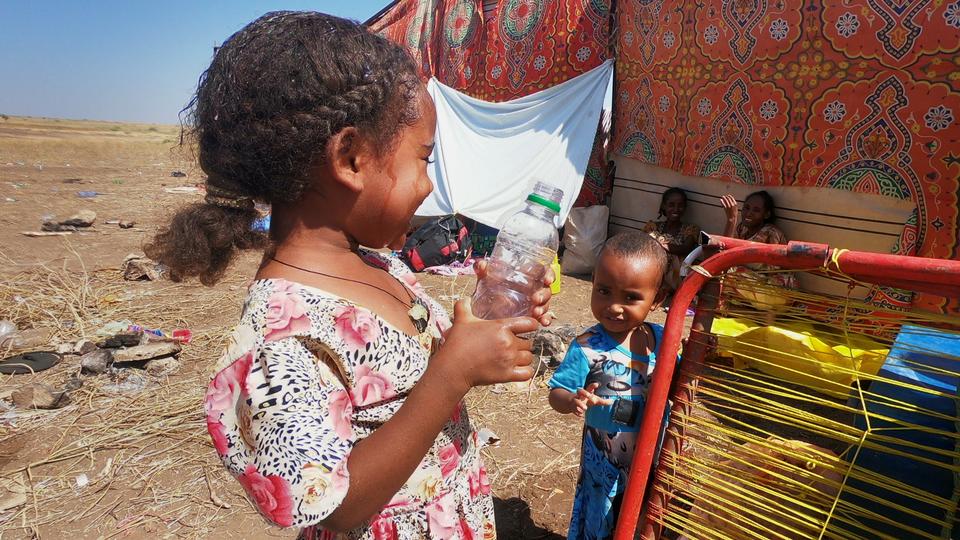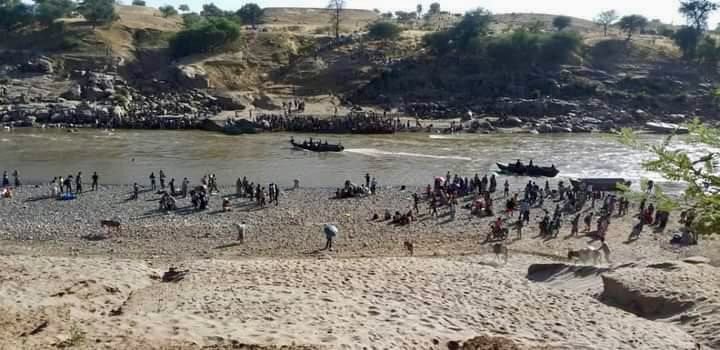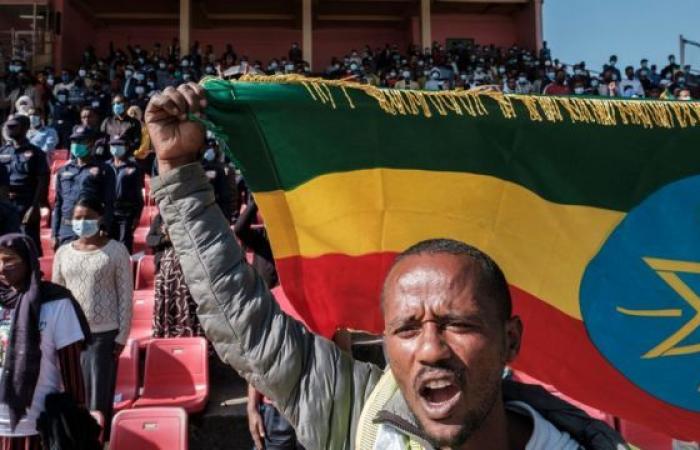A civil war seems to be brewing in Ethiopia. The fight is between forces loyal to the federal government headed by Prime Minister Abiy Ahmed and the Tigray People’s Liberation Front (TPLF) has already claimed hundreds of lives and is threatening to rip the country apart.
Both parties have accused one another of firing the first shots. The Prime Minister has said that army officers were murdered in cold blood. The Tigrayan leader Debretsion Gebremichael says there was aan attack by Ethiopian special forces and troops from Eritrea.

Two sides of the same story
Both sides also see Ethiopia’s history differently.
Ethiopian Emperor Haile Selassie was overthrown in a revolution in 1974. A military junta known as the Derg seized power.
It inflicted the infamous “Red Terror”, when tens of thousands of young people were murdered by the military regime, and a prolonged civil war against insurgents across the country.
The Tigrayans remember those as years of darkness with daily bombing raids by air force. In the town of Hausien in 1988 on 1,800 marketgoers died during an air raid and the smoke and dust from the bombardment literally turned a bright day as dark as midnight.
A coalition led by the TPLF, the Ethiopian People’s Revolutionary Democratic Front (EPRDF) defeated the military government in 1991.
On the day they took power, the EPRDF leader Meles Zenawi, a Tigrayan, said that his number one goal was for Ethiopians to be able to eat three meals a day.
Over the EPRDF’s 27 years in power the child mortality rate fell from about one in five to one in 20.
Famine was banished. Large-scale civil war was ended.
But Ethiopia did not see democracy. Prime Minister Abiy and his followers call these “27 years of darkness“.
A rising generation of young people felt silenced and shut out of political participation.
They argue that a clique of Tigrayans dominated politics, the army and the economy for their own benefit.
Abiy Ahmed, Oromo by tribe, was swept to power on a wave of discontent. The EPRDF chose him as party leader – and hence prime minister – in 2018.
He rapidly liberalised politics. He dissolved the EPRDF coalition and set up a new party – the Prosperity Party.
These moves won him popular acclaim even though there were still critics.

Abiy made peace with Eritrea, he won the Nobel Peace Prize last year for his efforts, and became a close confidante of President Isaias Afwerki, despite the Eritrean leader’s long-stated aim of dismantling Ethiopia, beginning with its army.
Mr Abiy is a devout Pentecostalist. His writings, including his PhD summary, read like self-help business school manuals. He does have massive support among the Amharas in Addis Ababa and the Amhara region but he and his party have not faced an electoral test.
According to Mr Abiy, the TPLF started the issue when it held regional elections in September.
The federal government had not authorised those elections and the Prosperity Party was not able to contest.The TPLF counters that national elections had been scheduled for earlier in the year and repeatedly postponed – partly because of Covid-19 – and that the government’s term had expired without a firm date for a poll. They say that theirs is the only regional government with a mandate from the voters.
What the constitution says
The country has a federal system in which the major ethnic groups administer their own regions which was adopted in 1994 shortly after the EPRDF took power
Mr Abiy wants to do away with this provision.
The aim of this provision was that if there were to be a democratic collapse at the centre, a region could go its own way.
This was demanded not just by the Tigrayans, but by leaders from other historically marginalised groups, including the Oromo – Ethiopia’s largest ethnic group.
The TPLF has not demanded separation. But the logic of today’s confrontation is leading them down that path.
TPLF political domination was resented by many Oromos and other ethnic groups in southern Ethiopia. But all of them treasured the self-government articles in the constitution.
Indeed, one of these groups – the Sidama – voted to have their own federal state last year.
More on recent happening
This year has seen the Prime Minister turned against the Oromo youth movement that brought him to power.
After the killing of the Oromo singer Hachalu Hundessa, more than 150 people died in riots and Mr Abiy clamped down and imprisoned upwards of 10,000 people.
Among them are Jawar Mohamed, founder of the Oromo Media Network, who faces terrorism charges. Another is veteran opposition leader Lidetu Ayalew who remains in prison despite a court ordering his release.
Armed gangs calling themselves the Oromo Liberation Army killed more than 50 Amhara villagers in Wollega district two weeks ago.
Mr Abiy blamed “Ethiopia’s enemies” determined to “rule or ruin the country” – code words for the TPLF.
His power base is among a mostly Amhara political elite that wants to abolish the federal system in favour of a unitary government system.
There are many good reasons to criticise ethnic federalism, but Ethiopia’s diverse groups have made it clear that – well armed and politically aware – they cannot be ruled against their will.
Reports from the war front indicate a massacre of Amhara civilians. Reports from Addis Ababa and other towns tell of the mass round-up and internment of Tigrayans.
Ethiopians are running into Sudan for refuge.

Government forces have imposed a news blackout on Tigray. They are also mounting a total blockade on the region, halting supplies of humanitarian aid.
The TPLF says it has captured Eritrean troops who invaded Tigray.
Mr Abiy’s declared war aim is to impose federal control on Tigray.
No observer of Ethiopia believes that is possible. Eritrea’s president, who some believe may have been involved in the planning of the Tigray invasion, has not spoken.
Ethiopia’s conflict is escalating out of control by the day.

